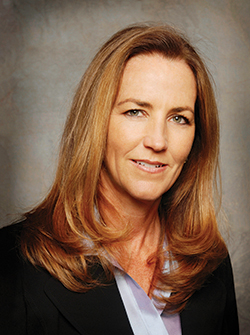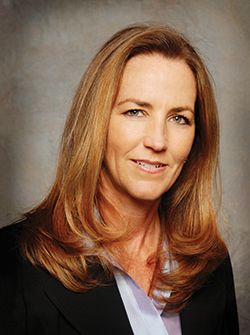 WENDY WEBB, co-chair of WomenCorporateDirectors, Los Angeles/Orange County and is a National Association of Corporate Directors Board Leadership Fellow. Director Wynn Resorts and ABM Industries.
WENDY WEBB, co-chair of WomenCorporateDirectors, Los Angeles/Orange County and is a National Association of Corporate Directors Board Leadership Fellow. Director Wynn Resorts and ABM Industries.
What attracted you to the boards of Wynn Resorts and ABM Industries?
The two companies are quite different, not only their industries (luxury-integrated resorts B2C vs. facilities services B2B), but also age (Wynn was founded in 2002; ABM in 1909) and global reach (the majority of Wynn's revenues are generated in the Macau special administrative region of the People's Republic of China; most of ABM's revenues are domestic). That being said, Wynn Resorts and ABM Industries share several factors I found intriguing and that make my board service for each interesting and gratifying.
First, I was attracted to these boards because, coincident with becoming a director, there was CEO succession. It has been exciting to constructively influence from the boardroom the development of opportunities for long-term shareholder value creation under new and dynamic leadership.
Additionally, I am honored to serve on these boards to help shape the success of companies with large numbers of employees — Wynn has 25,000 employees worldwide; ABM over 130,000. I was attracted to the significant ongoing responsibility in terms of corporate culture and employee engagement actively considered from both boardrooms.
Third, the diverse experiences and apparent integrity of my fellow board members were also part of the attraction to Wynn and ABM. Who wouldn't relish the privilege of serving side by side with a cabinet secretary nominee, the director of a major oil and gas company, the leader of a significant utility, or the CIO of a Fortune-25 company, an ambassador to China or an admiral?
How did you end up on those boards?
These board opportunities came through my network of long-time professional contacts. In the case of Wynn Resorts, my name was surfaced by people who already knew me — a very well-regarded governance expert based in New York City as well as an executive search firm with professionals in New York City and Miami. Similarly, ABM came to me from a long-time contact in executive search, based in my home market of Los Angeles.
You have a deep list of boards you've been on, including TiVo, PetSmart Charities and Jack in the Box. What do you think makes you a sought-after director?
Skills, track record and industry perspective are important. I am experienced in large and mid-sized public companies, both as a board member and a C-suite executive with significant roles in strategy-setting, global expansion, investor relations, M&A and digital initiatives. My professional past includes well-known global and branded enterprises like The Walt Disney Company and Ticketmaster Inc. I am a board audit-committee-qualified financial expert.
I think equally important are my personal attributes, like creative problem solving, sound business judgment and working toward common growth objectives. I've been recognized as a constructive director who “thinks like a shareholder.”
Have you found yourself outnumbered by men on most of the boards you sit on? If so, have there been challenges or benefits? Do you feel your opinions have been valued? What did you do to garner respect in the boardroom?
All my boards have been majority male and, yes, I've sat in boardrooms where I was the only woman. I try to develop relationships with my fellow directors, male and female alike. I think that when you give respect and professionalism, you get respect and professionalism.
My current boards are diverse, with three of 10 independent directors who are female on the ABM board, and four of nine independent directors who are female on the Wynn board, which is in the top 40 among S&P 500 companies in terms of female board representation.
Women directors symbolize hope and enlightenment in a company. More than once I have had a woman employee say, “I cannot tell you how important it is to me to see you serving at the highest level of our organization — it tells me that women are valued here.”
Do you think women and minorities need more help onboarding when it comes to board appointments?
I hope no one is added to a board for their gender or race or ethnicity alone, but instead by qualifications of achievement, experience, business judgment and “fit.” Part of that fit could be that a director offers a diverse viewpoint or background that may not yet be reflected on the board. An individual's emotional intelligence should be already commensurate with the role he or she is being asked to consider at the board level.
I think an onboarding program with insights on a company's industry, competitive set, human capital issues and key strategies is a best practice. All new board members benefit from such an intensive program as it helps them move up the learning curve and add value in the boardroom more rapidly.
What are the top priorities for you when you sit on a public company board?
My highest priority as a director is paying attention to the levers at a company that can create long-term growth in shareholder value.
How did you end up in business and ultimately into the boardroom given your college degree was in English literature?
Although I was always strong in math and science too, having a concentration in literature allowed me the great privilege of spending time seeing the world through others' eyes. I could be immersed in poverty in medieval England one moment, and experiencing the Roaring ‘20s at a party on Long Island the next. This gave me lots of practice looking at human perspectives and motivations, which is actually a valuable skillset in the business world — in negotiations, managing people, pursuing strategies and figuring out how to get stuff done.
Similarly, in the boardroom, good decisions are the result of considering the interests of stakeholders — shareholders, customers, employees, management, suppliers, competitors, communities — and what they need, what they want and what they expect.
What advice would you give individuals looking to serve on a public company board?
Boards are a team sport. Serving on a board is perhaps the only professional position you will have where you are one amongst a body of peers. There is no formal hierarchy, just one director, one vote. Therefore, consider carefully the people with whom you will serve. Do you want to be with them when they are helping to solve difficult problems or when they are making important decisions, like a multi-billion dollar acquisition, implementing a tough cost-cutting initiative, or replacing the CEO?
Consider the business and ask yourself will I be proud of the organization and its business offering? Can I add value to help the company thrive and grow? Where are the potential risks to the success of the organization, to the impact on its communities, to my personal reputation? Do I have the bandwidth to be fully engaged? Would it be interesting and challenging, even fun?
Regarding your appointment to Wynn Resorts' board, a company that has faced management upheaval given sexual harassment claims against its founder Steve Wynn, you recently said at a Wynn Women's Leadership Forum that there were similarities between Wynn and The Walt Disney Company, where you were an executive director and senior vice president. How so, and how do you think your experience will inform your board role at Wynn?
I'm excited to bring to the Wynn Resorts board not only my experience in global travel & tourism learned over two decades at Disney, especially the concept of quality guest service, but also knowledge about the nuances associated with transitioning from a founder-led company to the next phase of professional management. Additionally, given my background in investor relations and strategy, and through service on other public company boards, I recognize the importance of maintaining a sharp focus on creating value for shareholders. It is through this lens that I have approached my duties as a Wynn board member, while not losing sight of the company's culture and core values that make it a leading brand in the hospitality industry.
If there ever was a case study of a company listening to its shareholders and moving decisively forward, it is Wynn Resorts over the last several months. It has been very interesting to be part of the change at Wynn. Consider that in a matter of months the Wynn board:
• Oversaw the departure of its prior CEO, Steve Wynn, and helped manage the sale of 100% of his shares.
• Appointed dynamic new leadership at the helm of the company.
• Resolved outstanding litigation.
• Convened a special committee investigation in to tone and substance, enterprise-wide.
• Implemented policy changes and enhancements, including establishing an independent compliance committee that reports to the board's audit committee.
• Enhanced its employee culture and community focus, including launching women's initiatives and, for all Wynn employees, differentiators such as a mentorship program, scholarship program and new employee benefits like paid parental leave, a first in Las Vegas amongst casino resorts.
• Managed a major refreshment of its board, with more than half of its independent directors new to the company since April.



